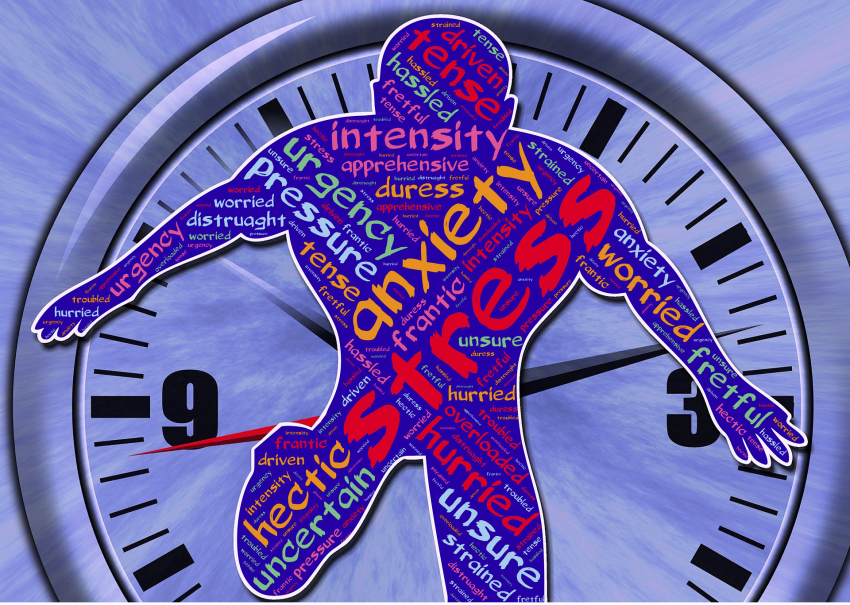10 Ways To Cope With Stress & Anxiety
Stress it's something we all encounter from time to time. That horrible feeling that causes you to feel irritable and worry at the same time.
What Is Stress?
Stress is basically your body's way of trying to deal and cope with and any sort of emotional or physical pressure. Although everyone will undergo some sort of stress throughout their life it can happen regularly; on a daily occurrence if something is causing it but isn't being dealt with. This could be a toxic relationship or a bad work environment but it can also stem from things such as moving house, pregnancy, a new job or even losing your job. It can feel very overwhelming at times especially when you also suffer from anxiety, trust me I am in the same boat right now as I am unemployed but trying to find a new job.
So, How Do You Identify Stress?
There are several symptoms of stress. These include but are not limited to:
- Trouble sleeping or feeling tired
- Irritability
- Loss or gain of appetite
- Constant worrying
- High blood pressure
- Racing heart or chest pains
- Problems focusing and concentrating
- Lack of memory
- Sweating

Image by John Hain from Pixabay
It might seem like stress is taking over your life but there are some things that you can do to try and reduce stress and cope better with your anxiety (if you also suffer from anxiety).
Here are the 10 tips to help you better manage your stress and anxiety:
1. Breathe
Yes, you may have heard this a thousand times as I have too but this tip really does really help! It helps you to focus your mind and to calm yourself down. The next time you feel anxious or stressed close your eyes and inhale slowly to the count of five and then exhale to the count of five. Repeat this as many times as you need to and you should feel yourself start to relax. I was told this tip by a therapist and I use it any time I have a panic attack.
2. Find a hobby
What do you love to do? What do you enjoy? Having a hobby is a great way to shift the focus of your mind from your stresses and worries. Make a list of all the things you enjoy doing, for example, gardening, reading a book, running, meditating and then pick one or two that you think will help when you feel stressed. The next step is to allocate some time during your day to do the activity so go ahead and plan a time that suits you best. Another tip I learned from a mental health course I did for my anxiety was to record how you feel before and after doing the activity. This is a pretty useful tip because you can actually monitor your feelings and see if your activities help to decrease your stress. If you notice that after a few attempts of doing a certain hobby that it didn't work very well you can always change that hobby to one that might work better. It is all about trial and error here. Remember, there is no right or wrong way. It is simply a matter of whatever works best for you. In my case, I prefer to go for a long walk as I find my mind relaxes more and I start to feel happier and think more positively.
3. Keep a Diary
Keeping a diary allows you to write down how you are feeling. Some people find that writing down how they feel makes them feel better. An alternative idea is to write down one positive word about yourself everyday or one thing that you have accomplished everyday. It doesn't matter how small the accomplishment is, what matters is that you did it. For example, getting out of bed is a small accomplishment when you feel your anxiety is at an all time high. Always remember great things take time and everything starts with small steps.
4. Positive Notes & Reminders
Leaving yourself positive notes or quotes from your favourite Instagram accounts or authors around the house wherever you are most likely to see these such as on the bathroom mirror or on the fridge in the kitchen is a good way to help cope with stress and anxiety as it reminds you to focus on the positives. I, myself, follow a few motivational accounts on Instagram as I really appreciate seeing positive reminders that help me to feel better. Sometimes all it takes is a positive quote to make you feel better.
5. Write Your Worries Down
Some people prefer to write their worries down on a piece of paper as it allows their worries to leave their mind. You could keep a journal for this or you could keep your pieces of paper inside a box.
6. Get Plenty of Sleep
Getting plenty of sleep is important for your body to repair itself and to keep you healthy. If you don't get enough sleep (the recommended 8 hours) it can cause you to have appetite changes, mood swings, low energy and trouble concentrating. Therefore, it is important to set yourself a routine schedule for going to bed so that you make sure you get your full 8 hours.
7. Try Volunteering
Helping members of your community is a great way to help you cope with anxiety. I decided to start volunteering at the beginning of this year to help others and to focus my mind on something else that was more productive for me. It helps you to socialise by meeting new people and it makes you feel good to know that you are helping others. Why not see what volunteering opportunities are available in your area?
8. Learning What Your Triggers Are
Although these are not totally avoidable knowing what your triggers are can help you to manage your anxiety better. A tip I was taught from my mental health course was to replace negative thinking with positive thinking. Instead of saying to yourself "I can't do this" try saying "I can do this". The more you keep telling yourself you can do something the better you will feel about doing it and once you have done it you will feel like there was no need to have worried in the first place!
9. Try Cognitive Behavioural Therapy (CBT)
CBT is a type of therapy that helps you to tackle your problems by breaking them down into manageable chunks. I found this type of therapy useful and helpful when copying with my anxiety as I have learned several copying techniques that I try to apply any time I have a panic attack. If you are unfamiliar with what CBT is then I highly recommend you to read this article on the NHS website which explains in greater detail what CBT is.
10. Talk to Someone
Probably the most important tip. Keeping your worries and stresses to yourself is really not the best idea as it can lead to other issues like lack of sleep and appetite and mood changes. You may think that you are burdening someone by talking about your issues but the truth is you aren't. Everyone needs a shoulder to cry on and an ear to listen at some point in time. You don't have to go throughout life dealing with everything on your own. Bottling things up doesn't really help. Please know and remember that you can always reach out to your friends, family, colleagues or your partner. I can't begin to express to you how much of a reassurance it is for me being able to talk to someone about my stresses and how much better I feel just by talking to someone. So, I highly encourage you to do the same. If you don't have anyone to talk to you can always visit a mental health help line.
Below are some of the many mental health organisations that exist that you can reach out to:
Samaritans: https://www.samaritans.org/?nation=scotland
Mind: https://www.mind.org.uk/
Mental Health Foundation: https://www.mentalhealth.org.uk/your-mental-health/getting-help

I hope these 10 tips help you to cope with your stress and anxiety. Remember, you don't have to use all of these tips, this is just a compiled list of some of the more helpful ones. The bottom line here is for you to find a way that works best for you to cope with your stress and anxiety. Remember, it takes time for these copying techniques to work, the more you stick at them the more effective you and they will be at managing your stress and anxiety.
(Source Anxiety UK)
Sources:
Hain. J (2016), Stress Category Business/Finance [Online]. Available at https://pixabay.com/illustrations/stress-pressure-anxiety-angst-1837384/ (Accessed 18th June, 2021)
NHS (2019), How it works - Cognitive behavioural therapy (CBT) [Online]. Available at https://www.nhs.uk/mental-health/talking-therapies-medicine-treatments/talking-therapies-and-counselling/cognitive-behavioural-therapy-cbt/how-it-works/ (Accessed 18th June, 2021)
Samaritans (2021), Homepage [Online]. Available at https://www.samaritans.org/?nation=scotland (Accessed 18th June, 2021)
Mind (2021), Homepage [Online]. Available at https://www.mind.org.uk/ (Accessed 18th June, 2021)
Mental Health Foundation (2021), Homepage [Online]. Available at https://www.mentalhealth.org.uk/ (Accessed 18th June, 2021)
Leninscape (2017), Yoga Category Beauty/Fashion [Online]. Available at https://pixabay.com/photos/yoga-outdoor-woman-pose-young-2176668/ (Accessed 18th June, 2021)
Practical Tips For Dealing With Anxiety (2019), YouTube Video, added by Anxiety UK [Online]. Available at https://www.youtube.com/watch?v=ttHu_N-zAnQ (Accessed 10th July 2021)
